The Samoyed is a wonderfully bright, athletic, and friendly breed known for its dazzling white coat and uplifting smile. This Smiley dog has won over many households and has a wonderfully rich history as a working dog in the coldest climates. Want to know more? We have everything you could want to know about this beloved dog breed below, including interesting facts, personality traits, and how to care for one of your own.
Samoyed Dog Breed Overview
- Group: Working
- Height: 19-24 inches
- Weight: 35-65 pounds
- Life Expectancy: 12-14 years
- Personality: Amiable and pleasant
- Activity Levels: Moderate-High
A Short History of the Samoyed
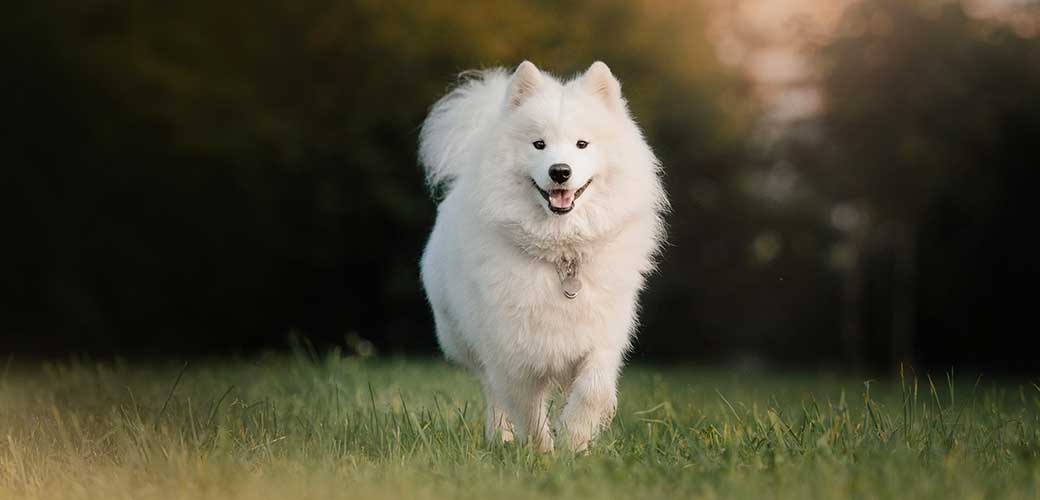
The Samoyed dog has been around for hundreds, maybe even thousands, of years. Bred to withstand the cold climate of Siberia, the Samoyeds’ job was to herd reindeer and was even known for pulling sleds and keeping the Samoyed people warm. These dogs also stood guard, protecting their humans and livestock, and quickly became friendly and beloved companions to those around them.
Initially, Samoyed dogs were employed to hunt reindeer, but as time went on, when the need for fur, leather, and meat shifted, they were used to herd them instead. It wasn’t until the 18th century that Samoyeds were introduced to England when Artic explorers returned with the breed. Around this time, Queen Alexandra fell head over heels for Sammie.
With so much to offer, the dog breed became a fast favorite to dog lovers across Britain, and they soon made their way to the US and were registered with the American Kennel Club by 1906.
Quick Facts About Samoyed Dogs
- The Samoyed is famous for its beautiful, white, fluffy coat.
- They have gained the nickname ‘Smiling Sammie’ thanks to their adorable smile.
- The breed has a thick double coat to withstand harsh, cold climates.
- Samoyeds were initially bred for herding reindeer and pulling sleds.
- The Samoyed dog breed is not considered hypoallergenic due to their shedding levels. These are quite moderate, but vulnerable people should be cautious.
- Shed Samoyed fur has been previously used to knit as a substitute for wool.
Samoyed Dog Appearance
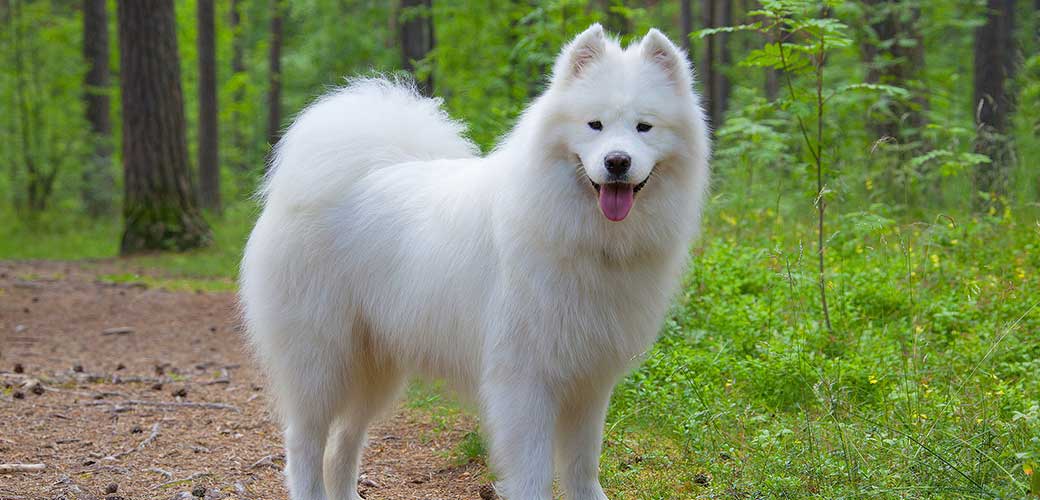
The Samoyed is regarded as a medium-sized dog breed with a sturdy build. Their fluffy appearance is completed by a plumbed tail that curves over the back. Not to mention, Samoyeds have dark pigments around the lips, nose, eyes, and lips that curl up, giving them a cheerful smile.
Height and Weight
The height and weight of a Samoyed will depend on its gender. Like many other dog breeds, females tend to be smaller and lighter than males. The general height and weight of your Samoyed are listed here:
Females:
- Height: 19-21 inches
- Weight: 35-50 pounds
- Males:
- Height: 21-24 inches
- Weight: 45-65 pounds
Coat Color and Markings
Although Samoyeds are famous for their snowy white coats, other shades are accepted as part of the breed standard. These include biscuits, cream, and white biscuits.
Regarding markings, Samoyed dogs have non and will have a solid color that runs through the entirety of their coats.
Samoyed Dog Temperament
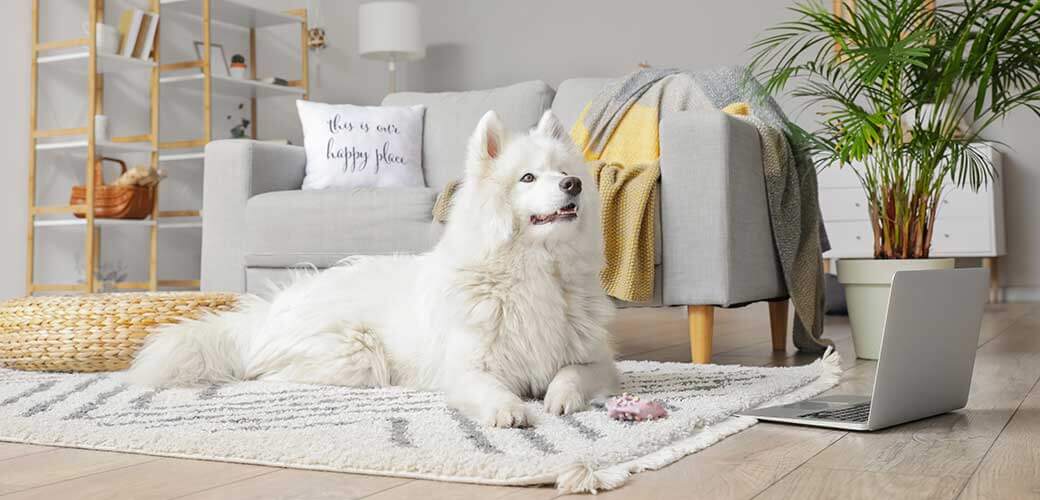
There’s a lot to say about the Sammie and their overall personalities. Like other former working breeds, Samoyeds have so much to give but also have some drawbacks that may make newbie dog owners think twice. Therefore, it’s important to understand what makes these dogs tick and what you should know about them before settling on getting a Sammie pup.
Intelligence
As mentioned, the Samoyed is a clever breed capable of picking up training easily compared to other dogs. Because of their high intelligence, these dogs often crave all kinds of mental stimulation, including interactive dog toys, dog sports, and even learning small but clever tricks at home.
Personality
Due to their working heritage, Samoyeds are known to be watchful of their surroundings, especially where their families are concerned. Since they are extremely loyal, they will often resort to excessive barking if they feel their territory/family is at risk from an unknown visitor.
However, this doesn’t mean they are aggressive or aloof. They are exceptionally friendly dogs and can take kindly towards strangers when out and about. One thing’s for sure, a Sammie will dote on their favorite humans and will follow them to the ends of the earth.
Sociability
Sammies are not regarded as independent dogs, so they can often become destructive when left alone. These friendly dogs dote on their families and crave human companionship daily. As such, you can expect a Samoyed to be an affectionate and loving dog.
Interacting with Children and other dogs
To add to the list of their already endearing personality traits, the Samoyed breed is incredibly playful and will therefore be the ideal playmate for young children. Additionally, if they are socialized well with other dogs from an early age, they will love nothing more than playing with other canines. Moreover, Samoyeds will remain playful when they enter their senior years.
Caring for a Samoyed Dog
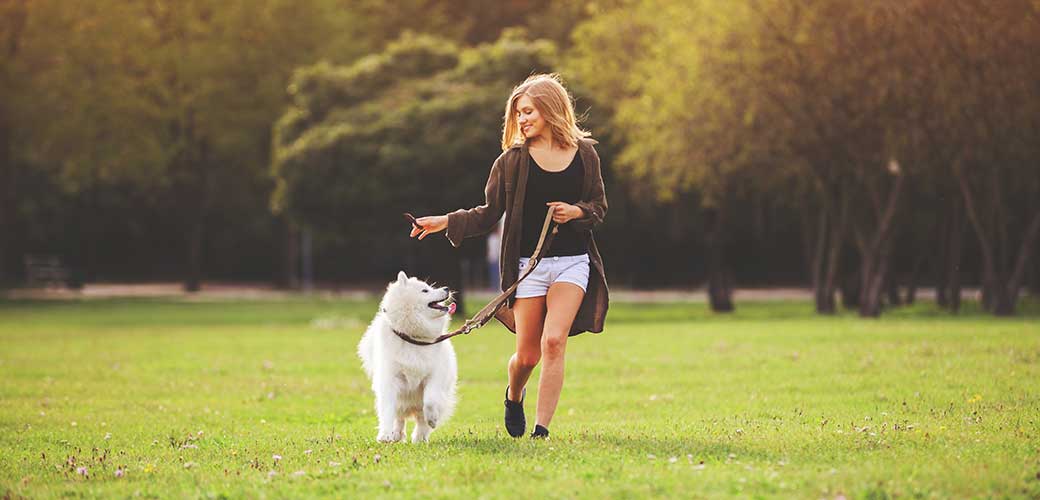
Your canine companion has specific needs integral to their health and happiness so knowing how to care for your Samoyed is extremely important. Below you can find everything you need to know as their requirements may just surprise you.
Entertainment
Since the Samoyed is an intelligent dog breed, it will need adequate entertainment to prevent it from ruining your home and furniture. As such, it is recommended that you take your Sammie to participate in dog sports. These activities will keep them mentally stimulated and help keep them fit and strengthen your bond. You can also get your hands on fun, interactive dog toys to keep at home when you cannot get to the dog park.
Besides toys, you can also purchase agility tunnels for your yard, which can be used to practice training at home. Following this point, you can always learn how to teach your Samoyed simple tricks at home, which is a great way to bond with them and keep them stimulated.
Exercise
Since Samoyed dogs have a history of herding reindeer, they will appear to have copious amounts of energy As such, they will love running and will roam endlessly if allowed. With this in mind, you must ensure your Sammie gets daily exercise to burn off the excess energy. This can be long walks, runs, or even a lengthy play session in the yard with the family.
Training
Although they are known to be one of the friendliest dog breeds, Samoyeds will still need to be properly socialized from an early age. If they are not exposed to other dogs or people, they can become shy and even vocally against anyone they come by. A great way to introduce them to others is by enrolling them in a puppy kindergarten class to get them used to other pups, sounds, sights, etc.
It’s important to understand that positive reinforcement must be used when training your Samoyed. Since they are smart, people-orientated dogs, they will soak up everything you teach them but lose motivation if the appropriate method isn’t used. To clarify, Sammies will thrive on verbal praise and treats when they do a good job, motivating them further in the future.
Although they seem like a dream to train, you must know that the Samoyed can be prone to boredom and may lose focus from time to time. This is rare since they are chronic people-pleasers, but if you find your Sammie’s attention dwindling, you may need to reevaluate your training sessions. Ensure they are short, fun, and full of positive energy to keep them focused.
Diet
What you feed your Samoyed depends on their age, so you should speak to a vet to ensure you’re providing your pup with the correct nutrition. Your vet will also recommend the best time to switch from puppy food to adult dog food and senior food.
Regardless of their age, you should ensure that you are feeding them high-quality dog food that will look after every inch of their well-being. Once you have settled on a brand and type (wet or dry), follow instructions carefully, as your dog can be prone to weight gain as they age. The correct amount will also ensure that they are fueled and provide enough energy to support their active lifestyle.
Before scrolling down this guide, feel free to check out our other dog food articles:
- Best Grain-Free Dog Foods
- Best Organic Dog Foods
- Best Senior Dog Foods
- Best Puppy Food
- Best Dry Dog Foods
- Best Cheap Dog Food
Shedding & Drooling Levels
The Samoyed breed comes with a thick coat composed of two layers. One long, straight outer coat and a wooly insulated undercoat. They are expected to shed profusely during each shedding season, but it’s common for them to shed moderately throughout the year.
For those looking for a dog that won’t harshly trigger allergies, it might interest you to know that Samoyed dogs drool very little. This is because of how their lips curl upwards, giving them their famous grin.
Grooming
Since the Samoyed has a long, thick, double coat, you will need to groom them more than other breeds. Since they are moderate shedders, you will need to brush their coats at least once weekly to remove loose fur and dander and eliminate any knots or tangles. In addition to this, you will need to bathe them every couple of months. This will keep them fresh and free from matting.
During shedding seasons, you must go from weekly to daily brushing. This frequent grooming will protect your house from rogue dog hair and help remove dead fur that would otherwise build up and make your canine uncomfortable.
General Hygiene
Like people, dogs need to have their teeth cleaned regularly to fend off dental conditions that could result in tooth loss. In addition to keeping their dental health in check, you will need to have their nails clipped when necessary. If they are left to grow, your dog’s nails can begin to bleed and cause them to walk with an uncomfortable gait.
You’ll also need a dog toothbrush and toothpaste – check out our top picks!
Grooming your Samoyed by yourself can be daunting, so there’s no harm in booking in with a professional groomer. A pro will tackle everything from bathing your pooch to brushing their teeth and clipping their nails.
Living Conditions
Knowing how to groom and feed your dog is crucial, but it’s also necessary to consider their living space. Samoyed dogs won’t adapt well to smaller homes such as condos or apartments. Instead, they will thrive in bigger houses with a securely fenced yard. This gives them plenty of space to roam and run around to burn off some of their energy.
Introducing them to other pets
You may also need to slowly introduce them to any other pets to give both parties the chance to adjust accordingly. Again, this is where socialization training will help, as it will teach help your pup to understand social interactions with other animals.
Samoyed Health Issues
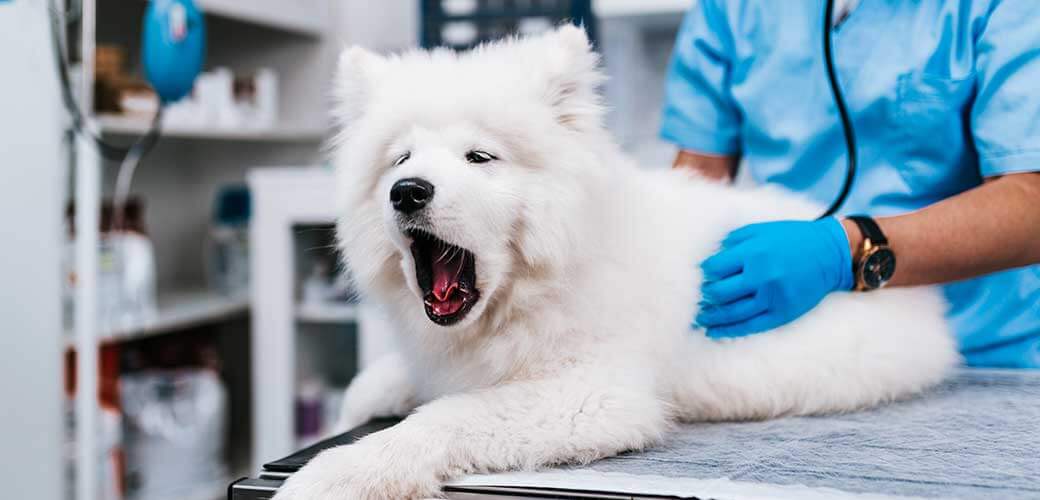
Responsible breeders will ensure their breeding dogs are screened and tested for the appropriate conditions. Therefore, Samoyeds are considered generally healthy dogs since the opportunity for health problems to arise is scarce.
However, there are several conditions that they can fall ill under, but it’s important to remember that not all dogs will develop health problems – so don’t panic!
Glaucoma
Dogs have two types of glaucoma, including primary and secondary. Both are extremely painful due to a build-up of pressure inside the eye.
To clarify, primary glaucoma is hereditary and is caused by a fault in the eye’s ability to drain fluid. This type often starts in one eye but then carries over to the other in time. Secondary glaucoma can affect more dog breeds than one and is typically caused when another eye condition prevents fluid from draining from the eye.
Sadly, glaucoma is incurable but can be managed well with eye drops and other medications. However, dogs with glaucoma will eventually go blind.
Hip Dysplasia
This condition is inherited from the pup’s parents and can affect many breeds. Hip dysplasia is summarised as a growth abnormality where one or both joints don’t allow the bone to insert or settle correctly.
This condition can be extremely painful for dogs and can even lead to arthritis. Although it cannot be fought off, there are some things you can do to alleviate the issue, such as controlled exercise, pain relief medication, and monitoring the dog’s weight. Surgery may be the only option to assist your dog in extreme cases.
Diabetes
Diabetes is another condition your dog can develop and will have to live with for the remainder of its life. It’s a huge commitment to look after a dog with diabetes, but dogs can live long and happy lives with the appropriate care and monitoring.
Symptoms of diabetes include low energy, excessive thirst, and weight loss. Therefore, along with regular insulin injections, it’ll be recommended that you monitor their diet and exercise regime to ensure they stay in good health.
Progressive Retinal Atrophy
This degenerative disease attacks the dog’s eyes, causing the cells to deteriorate over time. Affected dogs will eventually go blind and, depending on the type of PRA, can develop when they are puppies or adults.
Retinal Dysplasia is the inherited form that can affect puppies aged around 2-3 months, whereas the late onset known as PRA can affect dogs aged between 3-9 years.
Pulmonary Stenosis
This congenital defect is common in Samoyeds and is when blood is obstructed from traveling through the pulmonary valve. This valve connects the pulmonary artery to the right ventricle/one of four heart chambers.
A dog can develop a murmur or arrhythmia depending on how severe this is. In some cases, it can increase the risk of congestive heart failure.
Samoyed Hereditary Glomerulopathy
Samoyeds can develop this unfortunate genetic disease that affects the kidneys and is perhaps the more troubling condition on this list. Samoyed Hereditary Glomerulopathy is more severe in males as it is caused by an X-linked dominant faulty allele and can result in renal failure.
Males will appear perfectly healthy for their first three months of life but then begin to show symptoms that ultimately cause kidney failure. For females, mild symptoms will occur at two-three months of age but will not die due to kidney failure.
There is no cure for SHG, but medications and diet options are available to slow the disease down. If you are concerned, there are some symptoms to look out for that may affect your puppy. These include:
- Lethargy
- Vomiting
- Excessive thirst
- Excessive urination
- Loss of appetite
- Weakness in the muscles
Vets can conduct necessary tests to identify the problem and may find more concerning symptoms which are listed here:
- High blood pressure
- Protein in the urine
- Anemia
- Hypoalbuminemia
Samoyed General Life Span
So, on average, how long do Samoyeds live? Typically, Samoyeds live anywhere between 12-14 years.
Although the list of potential health conditions for Samoyeds can seem larger than those for other dog breeds, it’s important to remember that not all Sammies will fall ill to them. To add, Sammie will lead a better life if you provide them with the best care, diet, and exercise plan. After all, a healthier dog is a happy dog and one that will grace your life for years to come.
Where Can I Find Samoyed Puppies?
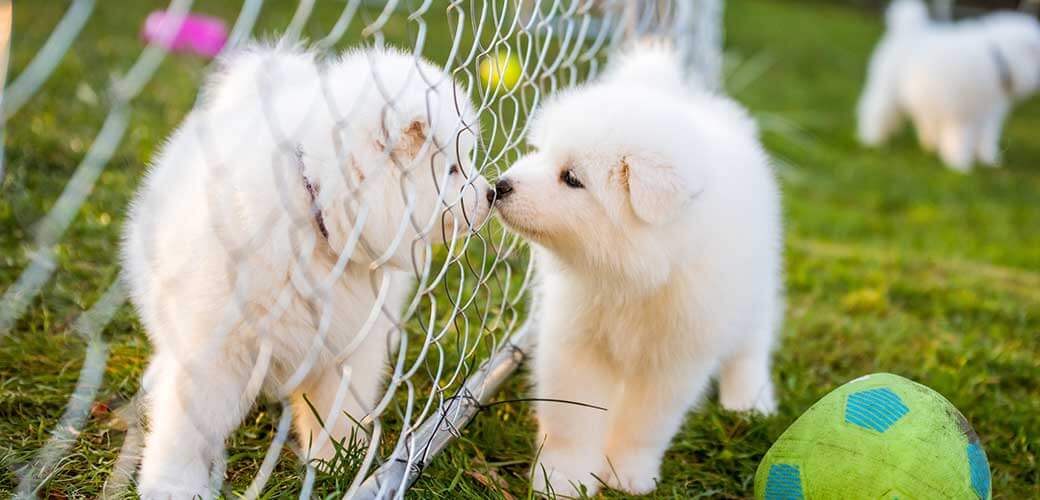
The Samoyed dog breed is a popular choice across the US, so finding a puppy may be easier than you think.
First of all, take a look at the national breed club dedicated to the Samoyed. The Samoyed Club of America has a list of trusted breeders and rescue resources and some in-depth information to help you care for your Sammie.
Secondly, consider browsing the AKC’s helpful marketplace for reputable breeders. More dog breeds can also be listed on their webpage, including details of trustworthy breeders (That’s if you change your mind about getting a Sammie).
Breeder Resources:
Otherwise, you can do your search to find breeders online. However, the drawback here is that you may not always be able to trust every breeder you come across. Therefore it’s vital that you fully prepare before approaching a breeder.
Tips When Approaching a Breeder
- Opt to see a breeder who follows the SCA’s code of ethics. This prevents the sale of puppies in a pet store and requires breeders to obtain the necessary health clearances.
- Make a list of questions to ask – A trustworthy breeder will welcome any queries and always give an educated and informed answer.
- A reliable breeder will ask you questions so they can be sure the pup is going to a good home.
- Avoid breeders who won’t allow you to meet the pup’s parents.
- Avoid breeders who refuse to provide proof of healthcare screenings for pups and parents.
- A trustworthy breeder will have the pup’s best interest at heart. This is a red flag if they seem eager to get rid of the litter.
- A good breeder won’t have puppies constantly available and will give their breeding dogs plenty of rest between litters.
- Do not pay online for your puppy.
If you sense anything suspicious with a breeder, flag it immediately. You can contact their breed club or local shelters/humane societies.
National Breed Club recommended health tests for Samoyed dogs:
Genetic health problems are sometimes unavoidable, but many recommended health tests can be completed for peace of mind. These include:
- PRA Optigen DNA test (And other eye clearances recommended by the Canine Eye Registry Foundation)
- Cardiac exam
- Hip evaluation
- Ophthalmologist
- RD/OSD DNA test
Samoyed Puppy Price
Samoyed puppies may be more popular than you think, and therefore you can expect to pay at least $1000, with some prices reaching up to $3000.
Typically, the price will vary depending on certain factors. For instance, if the Samoyed dog breed is in demand and there are few breeders producing pups, you can expect to pay a little more than usual. The price can also be affected by the breeders’ experience and the quality of resources.
Other Expenses To Consider When Buying Your First Puppy
Alongside the initial payment of your puppy, it’s important to remember the costs that can span over their lifetime with you. Some of these items are purchases made occasionally, but, as expected, their food and medical bills are long-term costs.
- Food
- Treats
- Neutering/Spaying
- Supplements
- Medications
- Flea and worm treatments
- Microchipping
- Beds
- Toys
- Leash
- Collar and name tag
- Harness (if necessary)
- Training resources
- Grooming supplies
- Pet insurance
Adopt Don’t Shop
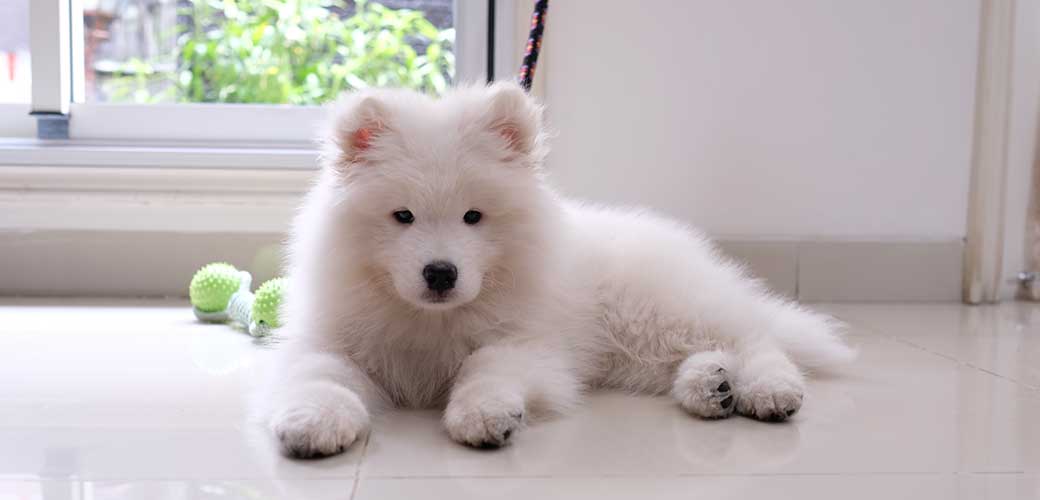
Adopting a dog can be one of the most rewarding experiences a dog owner can have. Finding your new best friend in a shelter is possible but may require patience. It’s also perfect if you’re specifically looking for an adult Samoyed rather than a puppy.
If you’re looking for the opportunity to rehome an adorable Samoyed puppy, look at the rescue pages below. Alternatively, keep checking the shelters and rescue centers in your local area.
Samoyed Rescue Resources:
- Samoyed Club of America
- The American Kennel Club Rescue Network
- Petfinder
- Adopt a Pet
- Animal Shelter
FAQs:
Q: Are Samoyeds easy to train?
A: Samoyeds are clever dogs that pick on training quickly. However, ensure you approach training with the right method otherwise, they can become bored or disheartened.
Q: Are Samoyeds aggressive?
A: Quite the opposite. Samoyeds are a people-pleasing breed that loves to spend time with their families, hence why it makes a great family pet!
Q: What is the average lifespan of a Samoyed
A: Samoyeds typically live between the ages of 12 and 14 but can live longer if they are in great health.

